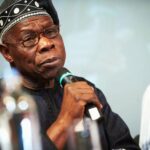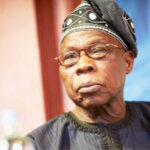Former President Olusegun Obasanjo on January 30, 2019, at the annual business lecture of the Lagos Island Club delivered by a former Vice-president, Alhaji Atiku Abubakar, who was then the presidential candidate of the PDP, called out President Muhammadu Buhari on the issue of integrity. Obasanjo had cynically dismissed what he described as Buhari’s “sanctimonious veneer of bogus integrity.”
Such a remark, coming from Obasanjo, carried some approbatory weight simply because of his pedigree as former military head of state and former president.
- 774,000 jobs: Thousands of participants yet to get stipend
- Poultry farmers set new price regime on eggs, meat
Obasanjo’s administration from 1999 to 2007 recorded a number of blights that have made it impossible for him to occupy a moral high ground from which to speak magisterially about the perceived shortcomings of his successors in office.
While I was ruminating on Obasanjo’s off-the-cuff remarks about his referenced Buhari’s “sanctimonious veneer of bogus integrity”, it became very clear to me that his remarks were simply self-deprecatory. What he admitted willy-nilly was that since as head of state and president, he could not be beyond reproach like Caesar’s wife, nobody else could. But Obasanjo missed the point. He should have been specific or better still, he should have particularised the variant of “bogus integrity” he was referring to. Covering the field as he had done in the circumstance of his malicious declaration was demonstrably unfair to Buhari.
But then, to be sure, Buhari is not a saint. Far from it! Besides, sainthood is not a parameter for election into the office of the President of the Federal Republic of Nigeria. To that extent, he has his foibles just as all of us have ours. You could accuse him of nepotism; you could slam the charge of religious bigotry on him; you could even accuse him of being an ethnic jingoist; these are all moot gravamina. One thing, however, that you cannot accuse Buhari of is financial corruption.
Therefore, in order to deconstruct Obasanjo’s verdict that seemingly tended to discount Buhari’s integrity capital, it was important to indict the obvious context of intense partisan frenzy in which the magisterial declaration was made. It was the nature of our nation’s cloak-and-dagger politics. Nevertheless, Buhari as the president is subject to open scrutiny, the basis of which should find anchorage in some comparison of his individuality with his predecessors’ individualities.
Surely, none in our recent history will be able to compare with Buhari’s Spartan lifestyle that feeds his revulsion for financial corruption and unconscionable acquisition of wealth through plundering and pillaging of public treasury. I have advisedly qualified Buhari’s integrity in the context of management of our nation’s financial resources to mean financial integrity because that is fundamentally the main purpose of governmental exertions: to manage the nation’s resources for the wellbeing of the citizens in the sphere of provision of infrastructure, et al.
If many administration officials are stealing public funds, and for which the leading opposition party is constantly sounding the alarm, it has not for once said that Buhari is the one stealing Nigeria’s money. When he was head of state at a much younger age, he did not pander to the allure of material things, not even the temptation to award his company (does he even have one?) or cronies oil blocks could be that overwhelming as to denature him and undermine his integrity capital, let alone now that he is 78 years old and has become a member of the pantheon of disciplined leaders, one who is well advanced into the evening of his life and times. Q.E.D.
Sufuyan Ojeifo contributed this piece from Abuja via [email protected],
 Join Daily Trust WhatsApp Community For Quick Access To News and Happenings Around You.
Join Daily Trust WhatsApp Community For Quick Access To News and Happenings Around You.


